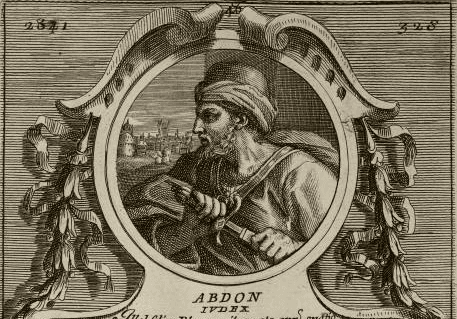Ab´don ( עבדּון , ‛abhdōn , perhaps “service”; Ἀβδών , Abdō̇n ) was one of the Judges of Israel mentioned in the Book of Judges (Judges 12:13–15). He was the son of Hillel the Pirathonite, a member of the tribe of Ephraim. He was preceded by Elon of Zebulun.
He judged Israel for eight years, B.C. 1233-1225. His administration appears to have been peaceful; for nothing is recorded of him but that he had forty sons and thirty grandsons, who rode on seventy donkeys — a mark of their consequence (Judges 12:13-15). So far as we can judge, he was placed in office as a wealthy elderly man, and performed the routine duties acceptably. Very likely his two next predecessors Ibzan and Elon were men of the same type.
An effort has been made to identify Abdon with the Bedan mentioned in 1 Samuel 12:11 , but the identification is precarious.
He was buried on Ephraimite land, in Pirathon, in the hill-country of the Amalekites.
A certain importance attaches to Abdon from the fact that he is the last judge mentioned in the continuous account (Judges 2:6 through 13:1) in the Book of Judges. After the account of him follows the statement that Israel was delivered into the hands of the Philistines forty years, and with that statement the continuous account closes and the series of personal stories begins – the stories of Samson, of Micah and his Levite, of the Benjamite civil war, followed in our English Bibles by the stories of Ruth and of the childhood of Samuel. With the close of this last story (1 Samuel 4:18 ) the narrative of public affairs is resumed, at a point when Israel is making a desperate effort, at the close of the forty years of Eli, to throw off the Philistine yoke.
A large part of one’s views of the history of the period of the Judges will depend on the way in which he combines these events. My own view is that the forty years of Judges 13:1 and of 1 Samuel 4:18 are the same; that at the death of Abdon the Philistines asserted themselves as overlords of Israel; that it was a part of their policy to suppress nationality in Israel; that they abolished the office of judge, and changed the high-priesthood to another family, making Eli high priest; that Eli was sufficiently competent so that many of the functions of national judge drifted into his hands. It should be noted that the regaining of independence was signalized by the reestablishment of the office of judge, with Samuel as incumbent ( 1 Samuel 7:6 and context). This view takes into the account that the narrative concerning Samson is detachable, like the narratives that follow, Samson belonging to an earlier period.
References:
Cyclopedia of Biblical, Theological and Ecclesiastical LiteratureMatthew Henry’s Complete Commentaryhttps://en.wikipedia.org/wiki/Abdon_(Judges)
